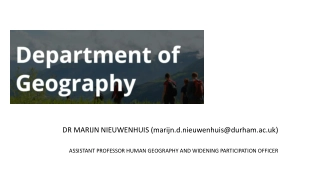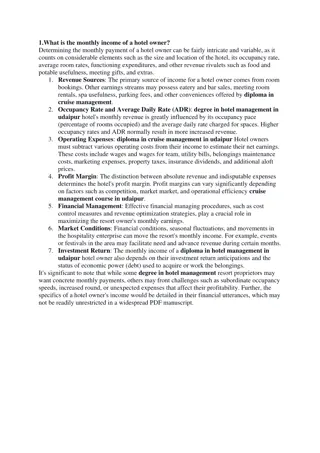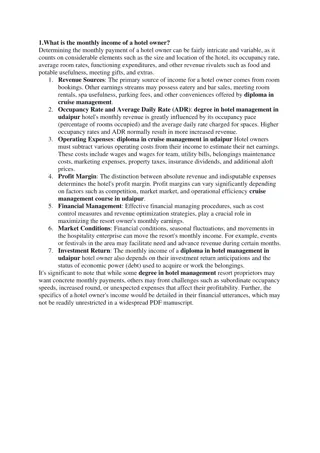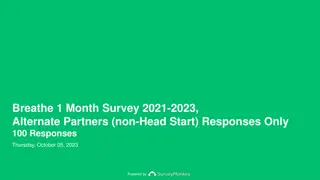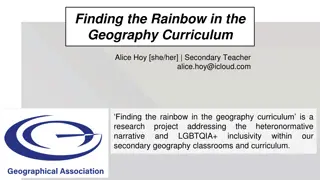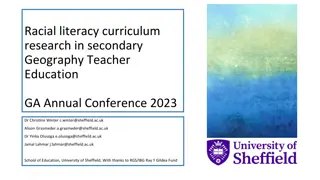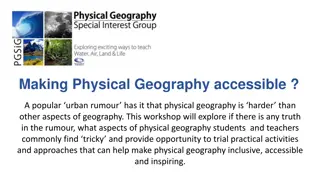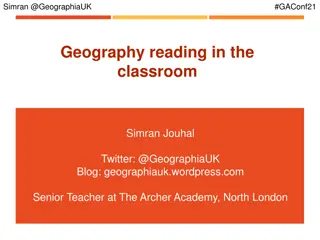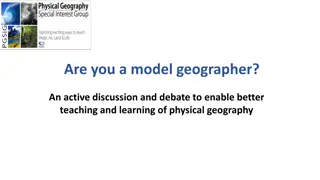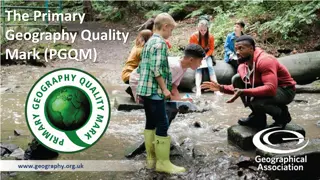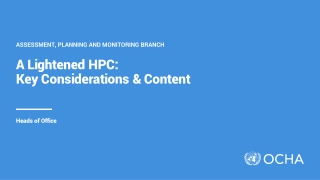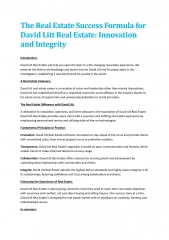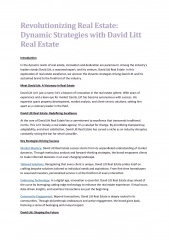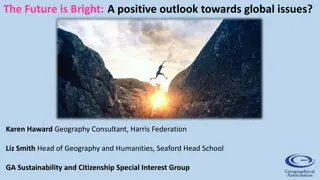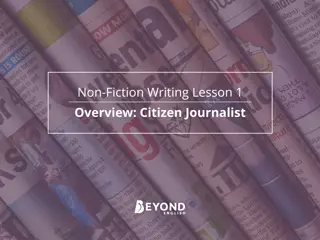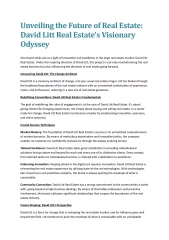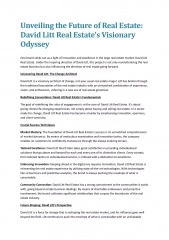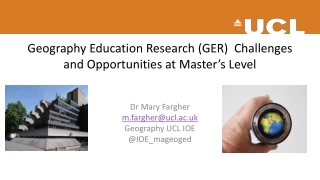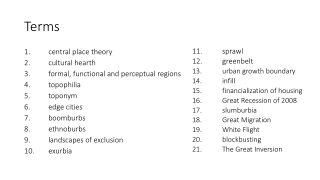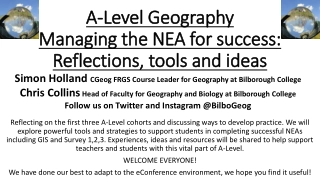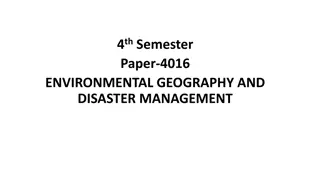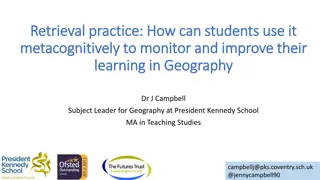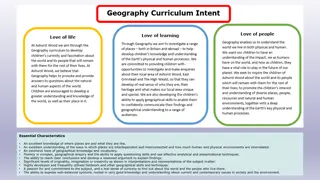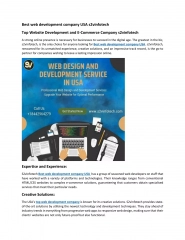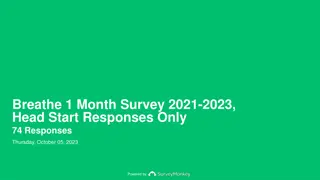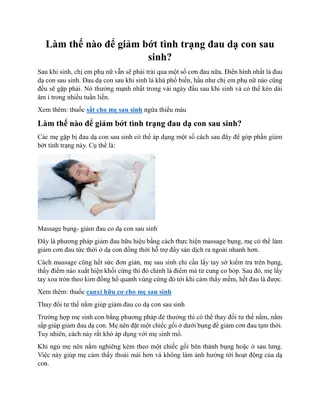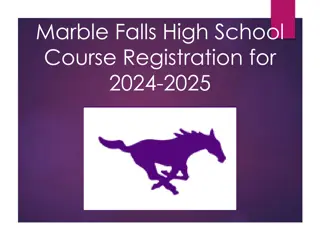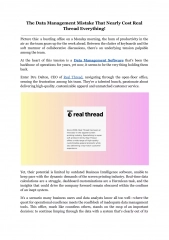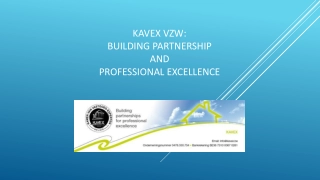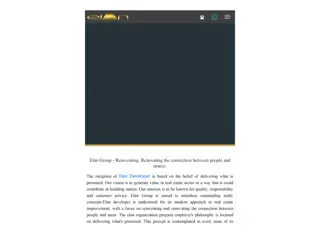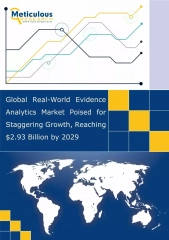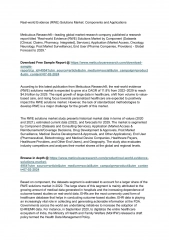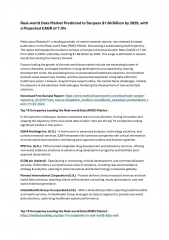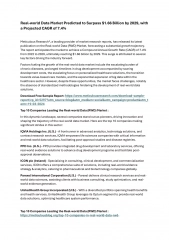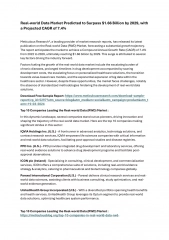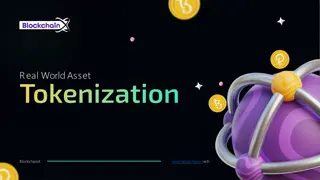Articulating the usefulness of geography in the real world.
Explore the evolving landscape of geography education through insightful data on student enrollment trends, subject choice theories, and barriers faced in teaching geography. Delve into how educators can leverage subject choice theory to enhance the options process and address student interest in both human and physical geography. Discover the valuable role geography plays in connecting students to the real world and fostering a holistic understanding of our surroundings.
Articulating the usefulness of geography in the real world.
PowerPoint presentation about 'Articulating the usefulness of geography in the real world.'. This presentation describes the topic on Explore the evolving landscape of geography education through insightful data on student enrollment trends, subject choice theories, and barriers faced in teaching geography. Delve into how educators can leverage subject choice theory to enhance the options process and address student interest in both human and physical geography. Discover the valuable role geography plays in connecting students to the real world and fostering a holistic understanding of our surroundings.. Download this presentation absolutely free.
Presentation Transcript
Articulating the usefulness of geography in the real world Dr Rebecca Kitchen GA Secondary Curriculum Leader
The fall and rise of geography GCSE GEOGRAPHY ENTRIES BY YEAR 300000 245964 250000 NUMBER OF STUDENTS 203862 200000 180737 150000 100000 50000 0 2007 2008 2009 2010 2011 2012 2013 2014 2015 2016 2017 2018 YEAR
The fall and rise of geography AS AND A LEVEL GEOGRAPHY ENTRIES BY YEAR A level AS level 60000 55801 50000 NUMBER OF STUDENTS 45302 37814 40000 37413 37195 30000 31714 31226 27617 20000 10000 0 2007 2008 2009 2010 2011 2012 2013 2014 2015 2016 2017 2018 YEAR
Subject choice theory The factors affecting subject choice at GCSE and A level. Structural factors advice given by others Individual attributes factors affecting own choice After: Kitchen (2017)
Students as Researchers Year 10 SaRs surveying their peers 69 completed questionnaires Responses from students who had chosen not to study geography at GCSE
Questions for discussion: Do these observations resonate with your own experiences or not? How might subject choice theory be used as a tool in the options process?
Barrier 1: Students are not necessarily interested in the geography that we teach.
More than one teacher we spoke with responded to the publication of the 2014 geography National Curriculum by suggesting that glaciation will not be of interest to my pupils . It is important to recognise that this attitude is coming from both theoretical constructions of physical geography and an increasingly prevalent societal view that the only valuable education is one that is directly relevant to a career or a practical application. (Clifford and Standish, 2017)
What I think basically I'm saying is no physical geography, just human geography! (Sabah) You meet people on a daily basis, if you go somewhere the people are what strikes you the most. Whereas I hadn't experienced any volcanoes and things. It's like the whole reading something in a book and you can't really connect with it. So, it was all well and good learning about these volcanoes and things but it didn't really apply to me. I felt I was learning it for the sake of being tested. (Olivia)
I felt pretty much the same about the topics no matter what the teacher was doing. (Sabah) I truly believe that teachers have a big influence, but it was the content more than anything. (Olivia)
Barrier 2: Choices are often made with potential careers in mind. Studying geography does not fit with these possible futures.
I mean there was a brief time when I was like Oh,Ill go to a conservatoire . I ll go to play music or I ll go to do composition or whatever and no, it s not seen as I think that if I was less academic then everyone would be saying Oh, you should do that, that s what you should do . But because I m predicted the high grades it s seen as a waste. And I will go and do something academic and will go and get a high paying job. (Marie)
Barrier 3: Students are unable to article the usefulness of geography in the real world.
I think Ill always have an interest in current events but I dont really think I m going to learn more about coastal erosion or glaciers Whereas current events will always be interesting for me and that s like the human geography and that s because I think that you can talk about it with less knowledge. If you were going to have a discussion about physical geography you have to know your facts and you have to know why it works. Whereas anyone can give an opinion on something to do with people, like the movement of people, because that is more common sense. That s what you get from experiences in life, not necessarily what you learn. (Marie)
Barrier 4: There is a clear subject hierarchy and geography is not at the top.
Science / Maths English / Humanities / Languages Arts
Idont know, cos I find it [geography] fascinating and thats what really annoys me, because my view of the world is shaped by going to an all-girls grammar school. That annoys me massively. It s [geography] not your nuclear engineering if that makes sense, but it s still valid, it s still an academic subject. It s not your cream of the crop. I mean we re always told we re the cream of the crop and expected to go for the cream of the crop subjects, your maths, your sciences, it gets all the funding. (Naomi)
Questions for discussion: Can you think of any other barriers to students choosing geography at GCSE and A level? Do these barriers accord with your own experiences? Which of these barriers is the most difficult to overcome?
Can we really do anything about uptake at GCSE and A level?
Barrier 1: Students are not necessarily interested in the geography that we teach. Possible solution: Where possible, make content directly relevant to students lived experience.
Local issues Topics they are interested in e.g. independent investigation
Barrier 2: Choices are often made with potential careers in mind. Studying geography does not fit with these possible futures. Possible solution: Explicitly articulate how geography does support many career paths. Tackle career myths .
In Year 9, your current topic of study is GLOBALISATION. The world needs to work out how to deal with: A possible increase in global conflict due to climate change Different opinions about whether globalisation is right or not Geographers will provide the answers!
Career myths Many universities and courses will consider you whatever subjects you choose. Students who want to take law are often told to study the likes of English literature and law at A level, but I personally think people should study what they like and are good at. Which? University Doctor, vet or dentist - needs chemistry, nice to have biology could do geography Engineering needs maths, may need physics or chemistry depending on the type of engineering could do geography
Barrier 3: Students are unable to article the usefulness of geography in the real world. Possible solution: Encourage students to see the benefits of a geographical education by articulating how it has helped them so far and how it will help them in their futures.
Geographical futures Year 9 unit Why is it important to study geography? How has geography helped me so far? How might it help me in the future? What is involved with studying geography at GCSE? What doors might it open for me in the future? What might the world be like in 2050? Possible, probable and preferable futures on a local, national and global scale. How might geographers be able to help solve the world s problems?
Barrier 4: There is a clear subject hierarchy and geography is not at the top. Possible solution: Difficult within social structures but can begin to subvert within our own contexts.
Questions for discussion: How can we articulate the usefulness of geography in the real world? How can we begin to subvert the subject hierarchy?



